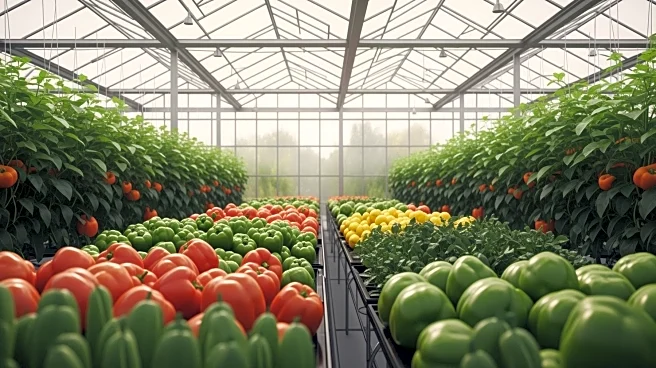What's Happening?
Mexico's protected agriculture sector, which includes greenhouses and shade houses, is experiencing significant growth. This industry has transformed from a niche segment into a major player in the agricultural
landscape, driven by export demand and technological innovations. From 1999 to 2019, the area dedicated to protected agriculture increased dramatically, with the Mexican Association of Protected Horticulture managing a substantial portion of these structures. The sector focuses on high-value fruits and vegetables, primarily for export to North America, with tomatoes, peppers, and cucumbers being key crops. Despite challenges such as water scarcity and labor shortages, the industry continues to thrive, supported by government incentives and modern production technology.
Why It's Important?
The expansion of Mexico's protected agriculture industry is crucial for the U.S. market, as it supplies a significant portion of high-quality produce, especially during winter months. This growth supports the U.S. agricultural supply chain, providing consumers with fresh produce year-round. The industry's focus on sustainability and efficiency, through advanced irrigation and hydroponics, addresses environmental concerns such as water scarcity and pollution. Additionally, the sector's reliance on exports strengthens economic ties between Mexico and the U.S., while also creating jobs and boosting Mexico's economy.
What's Next?
The industry is likely to continue its growth trajectory, with further investments in technology and sustainability practices. Mexico's clean energy transition, including solar and wind power, is expected to benefit the energy-intensive protected agriculture sector. The focus on organic production and expansion into Asian markets could diversify export opportunities. However, ongoing challenges such as labor shortages and economic pressures from currency fluctuations may require strategic adjustments to maintain competitiveness.
Beyond the Headlines
The protected agriculture sector's emphasis on sustainability and efficiency could serve as a model for other countries facing similar environmental challenges. The industry's ability to produce high-quality crops with reduced resource consumption highlights the potential for climate-smart agriculture to address global food security issues. As Mexico continues to innovate and expand its agricultural capabilities, it may influence international agricultural practices and policies.










